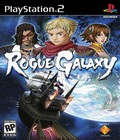Q: How would you describe the world of Rogue Galaxy? What were the influences in creating the story and overall art direction?
NH: The game is heavily influenced by iconic action movies and popular sci-fi franchises. We even include nods to some of them in-game in the form of parodies. After working on Dark Cloud, Level-5 decided we wanted to do something different. So they discussed possible projects and decided upon making a sci-fi game. Space pirates actually weren’t the initial choice – they toyed with the idea of a semi-futuristic game based around a [cyberspace premise]. But ultimately the concept didn’t reflect Level’s 5 signature style, so they did some tweaking and thus we have Rogue Galaxy.
Q: How is the combat system in Rogue Galaxy unique for an RPG?
NH: You control one character but have access to two allies that you control through various commands. As you progress through the game, you will have access to eight total characters, which you can switch out at any time. Of course, you can switch between the three characters at any time during battle. There is a unique suggestion system where your two allies will ask if they can perform certain attacks and you can instruct them how to engage.
The combat system isn’t so much magic focused but rather is based on an ability system. Each character has a certain set of special abilities that they can use. The combo system in this game allows the player to execute a barrage of strikes against an enemy to turn the tide of battle instantly. This system, called Burning Strike, is executed by collecting orbs that are dropped by the enemy during the course of battle. Once you gather enough orbs, you will be able to unleash the Burning Strike, a timing based combination system where you are able to chain together up to 9 strikes.
Q: Can you explain the weapons creation systems and how they work?
NH: There are two ways to create weapons in the game. The first is called Synthesizer Toady, which is a frog that takes two objects and combines them to create a weapon. The second is the Factory System, where you will get clues from other characters in the game on how to create an item get the raw materials, assemble a factory line, and create a custom weapon. There are more than 500 weapons in the game so depending on how players forge their weapons there will be different levels of how the weapons will perform.
Q: Can you discuss the mini-games in Rogue Galaxy? What is unique about them?
NH: One game is a quarry system where you will need to hunt down characters/elements throughout the game that have certain prices attached to them.
The other mini-game is called Insectron. This is a collection and fighting game where you go around trapping up to 20 species of insects, rear them, and then have them fight in a tournament. As you work your way up the rankings in the tournament you will earn prizes and other items.
Q: What does Rogue Galaxy bring that’s different from other console RPG games?
NH: The biggest thing is the lack of load times. Each of the worlds transitions seamlessly and you can explore vast amounts of any given world without any pauses. It’s not something you really notice until you play a game like this, but it’s amazing how much time we spend in front of load screens during normal RPGs. Once you play Rogue Galaxy and experience traveling from place to place seamlessly, it’s hard to go back.
The other big thing is the high polish and look of the game. It is a standout graphical experience, particularly for PS2. The team used its deep understanding of the hardware to push it as much as possible. I think it’s one of the best looking games on this platform.
Q: What’s the one reason RPG fans can’t afford to miss out on the game?
NH: It’s the ultimate edition of the title, offering even more content than the Japanese release. We went all out for the U.S. edition, adding new worlds, scenarios, stages and weapons. We’ve put in so much effort into this game that it really went beyond Localization. It’s the final realization of the team’s original vision for the game.
Q: Is this a completely new game engine than what Level-5 has used in the past?
NH: The graphic engine being utilized in the game is an evolution of the graphic engine they’ve used for previous titles.
Q: Do you think this might become a franchise title? Might we see the series appear on PSP or PS3?
NH: I definitely hope there will be more Rogue titles in the future—it’s a great game and has a great setting that will be perfect for sequels. But ultimately, it’ll depend on how well Rogue Galaxy is received in the US.
Q: Do you think that stylized graphics, like those of Rogue Galaxy, will still have a place on the next generation consoles, like the PS3, where the companies are trying to focus on more realistic games?
NH: Just like the movie industry where live action/CG/animation can coexist, I definitely think that there’s a place for stylized graphics on the next gen hardware. In fact, I think the hardware will allow developers to experiment with a multitude of different art styles.
More articles about Rogue Galaxy













 Rogue Galaxy is a fantasy-themed RPG which revolves around the game's main character, Jester Rogue. Players follow Rogue as he planet-hops around space, visiting a number of planets, each with their own unique ecosystem populated by various unusual creatures.
Rogue Galaxy is a fantasy-themed RPG which revolves around the game's main character, Jester Rogue. Players follow Rogue as he planet-hops around space, visiting a number of planets, each with their own unique ecosystem populated by various unusual creatures.